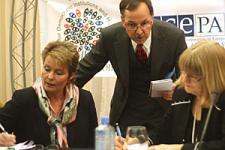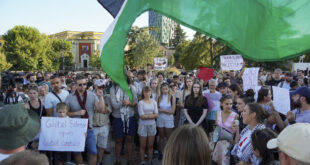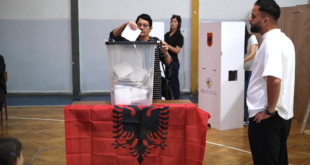 Macedonia’s voter register has to be revised, political experts argue after international monitors suggested that there seems to be a striking discrepancy between the number of voters and the overall population.
Macedonia’s voter register has to be revised, political experts argue after international monitors suggested that there seems to be a striking discrepancy between the number of voters and the overall population.
“It is impossible for a country of two million to have 1.8 million voters. That has to be addressed,” Pia Christmas Muller, the Vice-President of the Organization for Security and Cooperation in the Europe Parliamentary Assembly and the Coordinator of short-term observers in Macedonia’s local and presidential poll said on Monday, just one day after Sunday’s first round of presidential and local election.
“All the suggestions on how to revise the list are welcome,” Prime Minister Nikola Gruevski said on Tuesday. He argues that this is a 15 year-old issue and that he pointed out at several times. “But I still have not heard a concrete idea about which methodology to apply,” he said.
The mystery must be solved right after the election ends, Politics professor at the Skopje Law Faculty, Savo Klimovski told local Vreme daily. He notes that the problem lies in about 300,000 voters.
“We have to see where they came from,” he argues, noting that several years ago they were not enlisted. “It turns out that the in Macedonia, people do not die,” Klimovski concludes.
The State Election Commission already pointed this out at the Ministry of Justice that prepares the voter’s list. But the Ministry claims there are no irregularities.
The Justice Minister Mihajlo Manevski on Tuesday argued that the seemingly large number of voters might be due to the many people that are registered but work abroad.
“There is no mistake. The list is open for updating throughout the year and at the January public review there were no complaints,” the Ministry spokesperson, Mirjana Ilievska told the same newspaper. She notes that people can not be erased from the list because they did not give permission for that.
The professor at the University of Social Sciences, Stojmen Mihajlovski points out that if it turns out that the large number of voters is indeed due to the number of expatriates, nothing can be done.
“They are legal voters” he says and the regularity of election is not brought under question because of them.
The OSCE monitors on Monday assessed the first round of election as satisfactory, meeting most international standards. The country has to hold a free and fair election at the April 5 run-off as well if it is to amend the negative image from last year’s violence-marred June general election that claimed one life and left several wounded amid a clash between rival ethnic Albanian parties.
The EU set this election as a benchmark for country’s democratic credentials and conditioned their regularity with Macedonia’s swift progress towards EU integration.
 Eurasia Press & News
Eurasia Press & News


